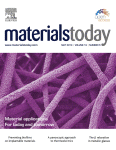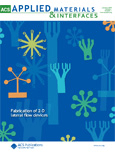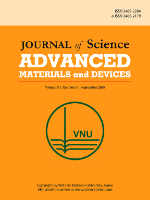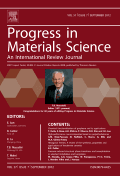
Materials Futures
Scope & Guideline
Catalyzing collaboration in cutting-edge materials research.
Introduction
Aims and Scopes
- Materials Synthesis and Fabrication:
The journal publishes research on novel synthesis methods and fabrication techniques for various materials, including nanomaterials, polymers, and ceramics. - Energy Storage and Conversion:
A significant focus is on materials for energy storage systems such as batteries and supercapacitors, exploring new materials and interfaces that enhance performance. - Nanotechnology and Nanoscale Materials:
Research on the properties and applications of nanostructured materials, including their use in electronics, catalysis, and biomedical applications, is a core area of interest. - Machine Learning and Data-Driven Approaches:
The integration of machine learning and data-driven methodologies in materials design and discovery is increasingly prominent, facilitating the development of advanced materials. - Biomedical Applications of Materials:
The journal explores the use of materials in biomedical contexts, including drug delivery systems, biosensors, and tissue engineering. - Electrocatalysis and Photocatalysis:
Research on electrocatalysts and photocatalysts for energy conversion and environmental applications is a vital area, focusing on improving the efficiency and stability of these materials. - Sustainability and Circular Economy:
An emerging theme is the emphasis on sustainable materials and recycling processes, addressing environmental concerns associated with material production and usage.
Trending and Emerging
- 3D Printing and Additive Manufacturing:
There is a notable increase in research focused on 3D printing technologies and their applications in creating complex materials and structures, reflecting a growing interest in customizable and efficient manufacturing. - Advanced Energy Materials:
Publications related to energy materials, particularly for batteries and supercapacitors, are trending upwards, emphasizing innovations in materials that enhance energy storage and conversion efficiency. - Biomaterials and Bioinspired Design:
Research on biomaterials and bioinspired design is gaining traction, highlighting the integration of biological principles into materials science for applications in medicine and environmental sustainability. - Machine Learning in Materials Science:
The application of machine learning techniques to accelerate materials discovery and optimization is emerging as a prominent theme, showcasing the intersection of computational methods and experimental research. - Flexible and Wearable Electronics:
There is a rising interest in materials for flexible and wearable electronics, driven by the demand for innovative devices in consumer electronics and healthcare. - Sustainable Materials and Recycling Technologies:
Research focusing on sustainable materials and recycling processes is increasingly important, reflecting a broader societal push towards sustainability in materials production and usage.
Declining or Waning
- Traditional Bulk Materials:
Research on conventional bulk materials, such as metals and alloys, is becoming less frequent as the field shifts towards more innovative and complex materials like composites and nanostructures. - Basic Theoretical Studies:
Publications focused solely on theoretical models without experimental validation are decreasing, possibly due to the growing emphasis on practical applications and interdisciplinary research. - Low-Tech Manufacturing Techniques:
Interest in traditional, low-tech manufacturing methods is waning as advanced techniques such as 3D printing and nanofabrication gain prominence in materials research. - Single-Application Focused Studies:
Papers concentrating on materials for very specific applications without broader implications or interdisciplinary connections are being published less frequently.
Similar Journals

Science China-Chemistry
Exploring Diverse Domains of Chemical ScienceScience China-Chemistry, published by SCIENCE PRESS, stands as a leading journal in the field of chemistry, specifically recognized for its contributions in miscellaneous chemistry domains. With an impressive Q1 categorization in the 2023 quartiles and ranking at #35/408 in general chemistry by Scopus, this journal places itself within the top 91st percentile, showcasing its significant impact in the discipline. The journal, based in Beijing, China, provides a platform for innovative research, reviews, and insights that cater to an international audience of researchers, professionals, and students dedicated to advancing chemical science. As an open-access journal, it ensures widespread dissemination of knowledge, making cutting-edge research accessible to all. With converged years from 2010 to 2024, the journal continues to be a vital resource for those engaged with the latest developments in chemistry.

Materials Today
Illuminating the Future of Materials ScienceMaterials Today is a premier academic journal published by Elsevier Science Ltd, specializing in the dynamic fields of materials science, mechanical engineering, and condensed matter physics. Established in 1999, the journal has garnered an enviable reputation, consistently ranking in the Q1 category across multiple disciplines including mechanics of materials and general materials science, reflecting its influence and high-quality research output. With an impressive Scopus ranking—4th in both mechanical engineering and mechanics of materials, and 6th in condensed matter physics—Materials Today serves as an essential resource for researchers, professionals, and students seeking to stay at the forefront of developments in material innovations and applications. The journal is known for its commitment to publishing significant research findings and reviews, making it a vital platform for disseminating knowledge and fostering collaboration in the rapidly evolving materials field. Although it does not offer open access, its robust impact factor underscores the importance of the content published, ensuring wide visibility and citation among the academic community. Explore the rich tapestry of materials research with Materials Today, where groundbreaking insights pave the way for future technological advancements.

ACS Applied Materials & Interfaces
Advancing the Frontiers of Applied Materials and InterfacesACS Applied Materials & Interfaces, published by the American Chemical Society, stands as a leading journal in the field of applied materials, nanotechnology, and interdisciplinary research in medicine. With an impressive Impact Factor that places it in the Q1 category across Materials Science, Medicine, and Nanoscience and Nanotechnology, this journal consistently ranks among the top tier, evidencing its significance and influence in advancing scientific knowledge. The journal’s scopus ranking of 33 out of 463 in General Materials Science further underscores its critical role in disseminating innovative and high-quality research. Although it is not an open-access journal, a diverse range of access options is available, ensuring that vital research findings are accessible to a broad audience of researchers, professionals, and students. Targeting breakthroughs in the synthesis, characterization, and application of materials and interfaces, ACS Applied Materials & Interfaces serves as a pivotal platform for publishing cutting-edge studies essential for future technological advancements.

Journal of Science-Advanced Materials and Devices
Innovating for Impact: Your Gateway to Advanced MaterialsJournal of Science-Advanced Materials and Devices is a leading open-access journal published by Vietnam National University, dedicated to advancing the field of materials science through cutting-edge research and innovative developments. Since its inception in 2016, this journal has become a pivotal platform for sharing insights and discoveries in various subfields, including biomaterials, ceramics and composites, and electronic, optical, and magnetic materials. With impressive quartile rankings, including Q1 across multiple categories in 2023, and a notable Scopus ranking placing it in the top 15th percentile for ceramics and composites, it highlights the journal’s influence and prestige within the global academic community. Open Access since its launch, the journal aims to facilitate unrestricted dissemination of scholarly work, empowering researchers, professionals, and students to engage with the latest advancements. The Journal of Science-Advanced Materials and Devices is vital for those seeking high-quality contributions that influence both theoretical understanding and practical applications in the ever-evolving landscape of materials science.

PROGRESS IN MATERIALS SCIENCE
Catalyzing Innovation in Material StudiesPROGRESS IN MATERIALS SCIENCE is an esteemed peer-reviewed journal published by Pergamon-Elsevier Science Ltd, focusing on pioneering advancements and comprehensive studies in the field of Materials Science. With an ISSN of 0079-6425 and an E-ISSN of 1873-2208, this journal boasts a prestigious status, ranking in the Q1 category for Materials Science (miscellaneous) and achieving a remarkable 99th percentile in Scopus rankings, positioned 4th out of 463 journals in General Materials Science. Published from the United Kingdom, PROGRESS IN MATERIALS SCIENCE provides critical insights into the latest discoveries, trends, and methodologies shaping the materials science landscape, making it an invaluable resource for researchers, professionals, and students alike. Readers can explore rich content on subjects ranging from nanomaterials to biomaterials and beyond, all designed to foster innovation and knowledge dissemination in the materials science community. Although it is not an open-access journal, it remains a pivotal platform for high-quality research and essential discourse in this dynamic field.

MRS Advances
Advancing the Frontiers of Materials ScienceMRS Advances, published by Springer Heidelberg, is an esteemed academic journal that serves as a vital platform for disseminating cutting-edge research in the fields of condensed matter physics, materials science, and mechanical engineering. With an ISSN of 2731-5894 and an E-ISSN of 2059-8521, the journal is hosted in Switzerland and encompasses an impressive spectrum of innovative studies that impact both theoretical and practical applications. Throughout its converged years from 2012 and continuing through 2024, MRS Advances has established itself with notable rankings, including Q4 in condensed matter physics and Q3 in several related categories. This journal not only enriches the academic community with its rigorous peer-reviewed articles, but also encourages open discussions that further advance research innovations. Although currently not designated as an open-access journal, its accessibility through institutional subscriptions ensures that professionals, researchers, and students can engage with the latest advancements in the material science arena. Emphasizing its relevance, MRS Advances is dedicated to fostering interdisciplinary collaboration and inspiring new discoveries within the global research community.

Materials Today Advances
Exploring groundbreaking research for a sustainable future.Materials Today Advances is a premier open access journal, published by Elsevier, dedicated to disseminating cutting-edge research in the fields of Materials Science and Mechanical Engineering. Since its inception in 2019, the journal has quickly established itself within the academic community, achieving an impressive Q1 quartile ranking in both disciplines as of 2023, indicative of its high-impact contributions. Ranked #25 out of 672 in Mechanical Engineering and #46 out of 463 in General Materials Science according to Scopus, Materials Today Advances offers rigorous peer-reviewed articles that address the latest innovations and interdisciplinary approaches. Researchers, professionals, and students can benefit from the journal's open access model, ensuring widespread visibility and accessibility of groundbreaking findings. With the convergence of advanced materials research and practical applications, this journal represents a vital resource for those at the forefront of scientific discovery.

Advanced Materials Interfaces
Transforming Engineering with Interfacial BreakthroughsAdvanced Materials Interfaces is a premier journal dedicated to the exploration and advancement of materials science, with particular emphasis on the interfacial phenomena that govern the behavior of materials in various engineering applications. Published by WILEY in the United Kingdom, this Open Access journal, established in 2014, has quickly ascended to a Q1 category ranking in both Mechanical Engineering and Mechanics of Materials as of 2023, reflecting its significant influence and excellence in the field. With impressive Scopus Ranks, such as #81 out of 672 in Mechanical Engineering and #58 out of 398 in Mechanics of Materials, it serves as a vital resource for researchers and practitioners aiming to push the boundaries of materials innovation. The journal provides unrestricted access to its cutting-edge research, promoting collaboration and dissemination of knowledge among the global scientific community, solidifying its role as a vital contributor to the ever-evolving landscape of materials engineering.

Frontiers of Materials Science
Fostering Collaboration for Tomorrow's Material SolutionsFrontiers of Materials Science is a groundbreaking journal dedicated to exploring advanced materials and their applications within the ever-evolving landscape of materials science. Published by HIGHER EDUCATION PRESS, this journal offers a crucial platform for scholars and practitioners seeking to disseminate innovative research findings that foster interdisciplinary collaboration. Since its inception in 2011, the journal has enjoyed a notable Q2 ranking in the category of Materials Science (miscellaneous) as of 2023, positioning it among the noteworthy publications in the field with a Scopus rank of #222 out of 463. While predominantly published in China, the journal is committed to open access principles, allowing global accessibility to cutting-edge research. With its comprehensive coverage spanning materials synthesis, characterization, properties, and applications, Frontiers of Materials Science not only serves as a repository for academia but also bridges the gap between research and industry, making it an indispensable resource for researchers, professionals, and students alike.

Micro & Nano Letters
Connecting ideas in micro and nanoscale research.Micro & Nano Letters is a prominent open-access journal published by WILEY, dedicated to advancing the fields of micro and nanoscale science and technology. Since its inception in 2007, the journal has been a valuable resource for researchers, professionals, and students, delivering high-quality research that supports innovation and collaboration in bioengineering, biomedical engineering, condensed matter physics, materials science, and nanoscience. With an impact factor that reflects its growing influence, Micro & Nano Letters has earned recognition in various Scopus categories, including a Q3 ranking in both Condensed Matter Physics and Materials Science as of 2023. Its commitment to open access, established in 2021, ensures that the latest developments in micro- and nanotechnologies are accessible to a global audience, fostering a multidisciplinary dialogue across academia and industry. The journal continues to play a critical role in disseminating cutting-edge research and promoting technological advancements worldwide.